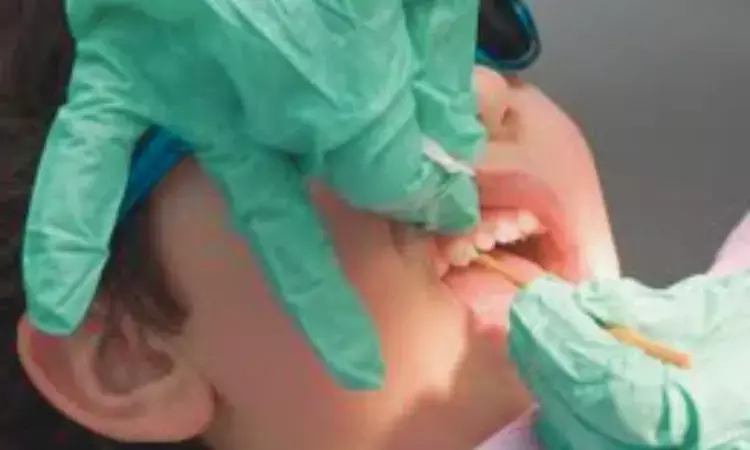- Home
- Medical news & Guidelines
- Anesthesiology
- Cardiology and CTVS
- Critical Care
- Dentistry
- Dermatology
- Diabetes and Endocrinology
- ENT
- Gastroenterology
- Medicine
- Nephrology
- Neurology
- Obstretics-Gynaecology
- Oncology
- Ophthalmology
- Orthopaedics
- Pediatrics-Neonatology
- Psychiatry
- Pulmonology
- Radiology
- Surgery
- Urology
- Laboratory Medicine
- Diet
- Nursing
- Paramedical
- Physiotherapy
- Health news
- Fact Check
- Bone Health Fact Check
- Brain Health Fact Check
- Cancer Related Fact Check
- Child Care Fact Check
- Dental and oral health fact check
- Diabetes and metabolic health fact check
- Diet and Nutrition Fact Check
- Eye and ENT Care Fact Check
- Fitness fact check
- Gut health fact check
- Heart health fact check
- Kidney health fact check
- Medical education fact check
- Men's health fact check
- Respiratory fact check
- Skin and hair care fact check
- Vaccine and Immunization fact check
- Women's health fact check
- AYUSH
- State News
- Andaman and Nicobar Islands
- Andhra Pradesh
- Arunachal Pradesh
- Assam
- Bihar
- Chandigarh
- Chattisgarh
- Dadra and Nagar Haveli
- Daman and Diu
- Delhi
- Goa
- Gujarat
- Haryana
- Himachal Pradesh
- Jammu & Kashmir
- Jharkhand
- Karnataka
- Kerala
- Ladakh
- Lakshadweep
- Madhya Pradesh
- Maharashtra
- Manipur
- Meghalaya
- Mizoram
- Nagaland
- Odisha
- Puducherry
- Punjab
- Rajasthan
- Sikkim
- Tamil Nadu
- Telangana
- Tripura
- Uttar Pradesh
- Uttrakhand
- West Bengal
- Medical Education
- Industry
Preterm Birth Linked to Increased Risk of Dental Defects and Periodontal Issues, suggests study

Researchers have found children born prematurely are at an increased risk for oral health challenges, which include developmental defects of enamel (DDE), poor periodontal health, and increased susceptibility to dental caries. A recent study was conducted by Heide L. and colleagues which was published in the Dentistry Journal. Prematurity, especially for extremely low birth weight (ELBW) babies, is considered a risk for dental and gingival health, suggesting long-term implications of oral health in preterm birth.
The study was aimed at assessing and comparing oral health parameters, such as dental caries, DDE, and gingival inflammation, between PT and FT children aged 7 to 9 years. The objective was to determine the effects of prematurity on oral health in the mixed dentition phase.
This was an observational study conducted on 38 preterm children and a control group of term children. Oral health assessments included prevalence of dental caries using ICDAS II and DMFT/dmft indices, enamel defects by the modified DDE Index, and gingival health by Periodontal Screening Index (PSI). The statistical analysis applied McNemar's test and Poisson regression with a significance level of p ≤ 0.05.
Key Findings
Dental Caries:
• The prevalence of caries was 47.4% among PT children and 57.9% among FT children.
• In primary dentition, FT children had significantly higher caries rates than PT children (2.7 dmft vs. 1.6 dmft; p= 0.035).
• PT children with ELBW showed the highest caries rates (3.2 dmft; 1.0 DMFT).
Enamel Defects:
• DDE prevalence in primary teeth was significantly higher in PT children (55.3%) compared to FT children (28.9%; p= 0.008).
Periodontal Health:
• PSI scores were slightly higher in PT children (3.8) than in FT children (3.3).
• PT children with ELBW had a significantly elevated PSI score (7.4; p = 0.125), which reflected increased susceptibility to gingivitis and other periodontal issues.
The study calls attention to the major risks related to oral health for children born preterm, with an even more vulnerable subgroup having ELBW. Increased prevalence of enamel defects and poor periodontal health alongside dental caries make the provision of dental care to this risk group very comprehensive. Dental check-ups and prevention can minimize such risks and foster better oral health outcomes.
Reference:
Schlesinger HL, Heinrich-Weltzien R, Schüler IM. Oral Health of 7- to 9-Year-Old Children Born Prematurely—A Case–Control Observational Study with Randomized Case Selection. Dentistry Journal. 2024; 12(12):421. https://doi.org/10.3390/dj12120421
Dr Riya Dave has completed dentistry from Gujarat University in 2022. She is a dentist and accomplished medical and scientific writer known for her commitment to bridging the gap between clinical expertise and accessible healthcare information. She has been actively involved in writing blogs related to health and wellness.
Dr Kamal Kant Kohli-MBBS, DTCD- a chest specialist with more than 30 years of practice and a flair for writing clinical articles, Dr Kamal Kant Kohli joined Medical Dialogues as a Chief Editor of Medical News. Besides writing articles, as an editor, he proofreads and verifies all the medical content published on Medical Dialogues including those coming from journals, studies,medical conferences,guidelines etc. Email: drkohli@medicaldialogues.in. Contact no. 011-43720751


